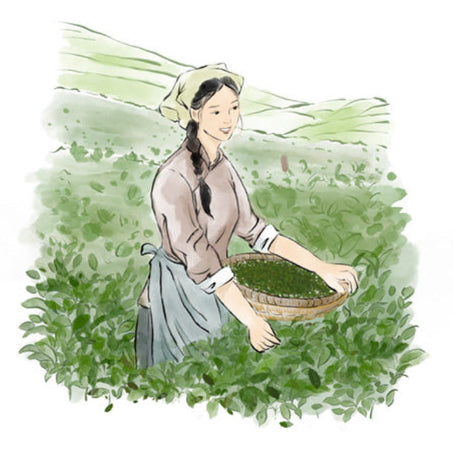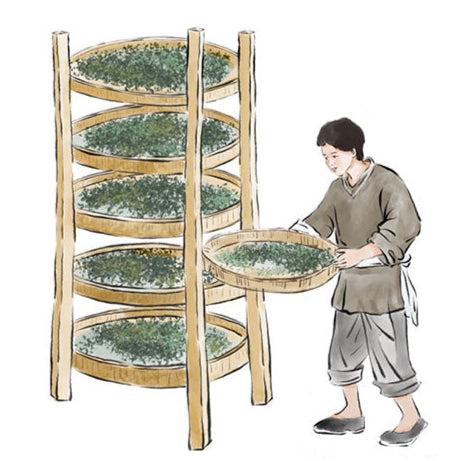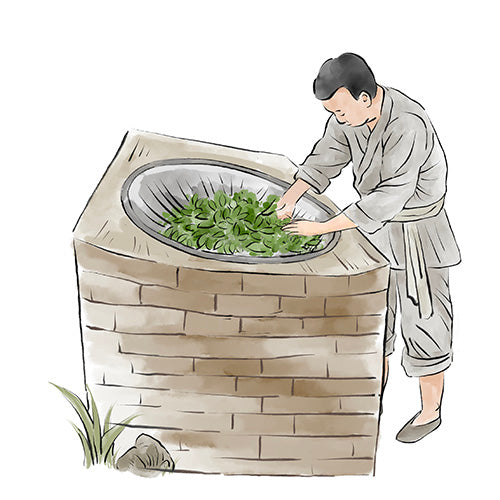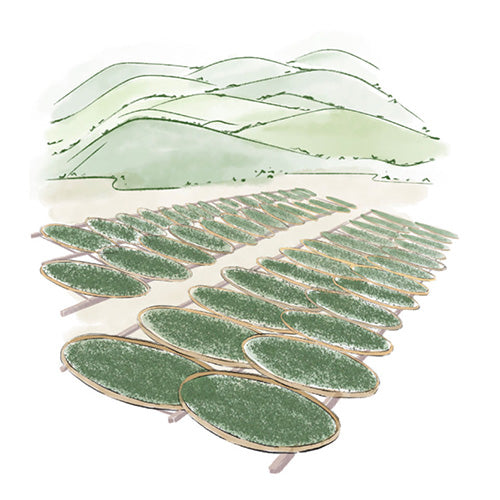West Lake Dragon Well (Long Jing)
West Lake Dragon Well (Long Jing)
Impossible de charger la disponibilité du service de retrait
Je vous présente un thé vert extraordinaire, qui enchante les sens par sa douceur enveloppante, sa torréfaction séduisante et la richesse enivrante de notes de noisette. Il provient du célèbre village de Mei Jia Wu, situé dans la région magique du Puits du Dragon du Lac de l'Ouest, un lieu où l'histoire millénaire du thé se mêle à la beauté sauvage de la nature environnante.
Les bourgeons de ce thé sont un trésor précieux, et le standard de cueillette est constitué de 1 bourgeon et 2/3 feuilles de haute qualité. Ils sont la quintessence d’une tradition millénaire, une fusion parfaite entre savoir-faire artisanal et savoir-faire agricole.
Chaque gorgée de ce thé est un voyage sensoriel qui vous transporte dans la magnificence d'une époque révolue. Les feuilles vertes délicates libèrent un arôme végétal enveloppant, une danse parfumée qui remplit l'air d'un parfum enivrant. L'infusion est une célébration des sens, un moment de pur enchantement où le thé se transforme en œuvre d'art liquide.
Mais le plaisir ne s'arrête pas là. Un arrière-goût frais et persistant enveloppe la bouche, laissant une sensation de propreté et de vitalité rafraîchissante. C'est comme un souffle de fraîcheur qui se diffuse progressivement, rafraîchit le palais et laisse une sensation agréable et durable. De plus, l'arôme traditionnel de châtaigne, issu de la cuisson à la poêle de ce thé ancien, lui confère un caractère unique et distinctif, ajoutant une note de chaleur et de tradition à la boisson.
Origine
Origine
- Brand: Teasenz
- Year: 2025
- Season: Autumn
- Cultivar: Qunti
- Origin: Mei Jia Wu, West Lake
- Type: green tea
- Weight: 70g
Comment préparer le thé
Comment préparer le thé
Western method
Infuse 3 grams of tea with 500ml water at a temperature of 80ºC and steep for 1 minutes. For a second steep increase the steeping time to 1.5 minutes
Traditional method
Infuse 5 grams of tea with 100ml water at 80ºC and steep for 20 seconds. Increase the steeping time by 5 seconds for every next steep.
Cold-brewing
For cold-brewing you may use a bottle, jug, teapot or any brewing vessel that has a lid. Use 10 grams of tea per 500ml of cold water. Cover the brewing vessel with a lid, and store in the fridge for 5-8 hours.
Expédition, retours et méthodes de paiement
Expédition, retours et méthodes de paiement
Délai de livraison : 1 à 10 jours pour l'UE. Pour des estimations par pays, veuillez consulter la page d'informations sur la livraison au bas de notre site Web.
Taxes douanières : comme nous livrons depuis notre entrepôt de l'UE, aucune taxe ne vous sera facturée à la livraison. Toutes les taxes sont déjà incluses dans nos prix.
Livraison gratuite : disponible pour les commandes supérieures à 59 € pour les Pays-Bas/Belgique, 80 € pour la France, les autres pays de l'UE et le Royaume-Uni, et plus de 100 € pour les pays hors UE.
Retours : les commandes peuvent être retournées pour un remboursement dans les 30 jours. Les produits doivent être retournés dans un état non ouvert et non utilisé.
Partager





How this green tea is made
-

Picking
Tea leaves are hand-picked in the morning.
-

Withering
Leaves are shortly withered to eliminate some moisture.
-

Fixation (pan-frying) & Shaping
Leaves are roasted on a wok to halt oxidation.
-

Drying
Tea leaves are dried to reduce moisture to a minimum.
Dry aroma is vegetal: pasture, barley, nuttiness, chestnuts. Lovely. Steeped at 80-85°C, the chestnut aroma comes through immediately when steeping. Soup tastes 99% of chestnuts, 1% grassy. Beautiful, light, not very complex, but pleasing.
Really great tea and the description on the website is pretty accurate about its flavour
One of the best Long Jing which I tried in Eruope.
Still fresh in September.
Hello Denis, we're glad you liked the freshness. Unlike most tea stores, we stock all our green teas in batches in the freezer. So the result is they will stay fresh all year. Every time we need to repack new green teas, we take a small batch out of the freezer.
Fresh, nutty and sweet. Great value for money for everyday longjing fans.
Fresh and fragrant from the first impact, the dried leaves express all the classic nature of this tea, with its flat shape and emerald green color with yellowish streaks. Infusing these teas is always a challenge because, unless you're a novice, you have so many points of comparison with those you've already drunk in the past. This one in particular manages to defy any provocation, even that of a Western-style infusion at 70°C for 2 minutes, which allows all its refined characteristics to emerge. The wet leaves add brilliance to the original colors and hint to the nose at the aromas and flavors the liqueur will unleash upon tasting. The very light and brilliant green color, almost transparent, frames a sweet, intense, and smooth flavor, with fresh, floral, and herbaceous notes, especially chestnut but also alfalfa, combined with a slightly toasted aftertaste. These characteristics make this Longjing a tea that cannot fail to please, even if you are not a lover of green teas.

Notre travail de design s'inspire de l'œuvre « Le long de la rivière pendant le Festival Qingming » de Zhang Zeduan, datant de la dynastie Song. Au lieu de représenter la vie quotidienne des habitants de la capitale chinoise (comme dans l'œuvre originale), nous illustrons le processus de fabrication du thé par les agriculteurs, adoptant la même perspective à vol d'oiseau.
En observant notre design d'emballage en détail, les amateurs de thé pourront découvrir les étapes de production : les cultivateurs cueillant, séchant, roulant et torréfiant les feuilles de thé. Le thé est ensuite dégusté dans un pavillon, puis transporté par des chevaux le long de « l’ancienne route du thé ».
L’alliance entre le paysage traditionnel chinois et le thème de la fabrication du thé symbolise l'héritage, la tradition et le respect pour le dur labeur des cultivateurs de thé.











